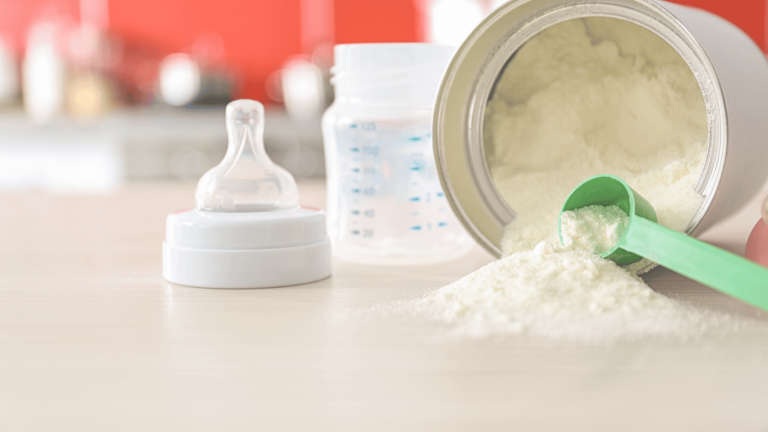“Why is my baby fussy?” This is a common question that i’m sure every parent has googled at some point or another–probably after the hours of midnight. Within the first 12 weeks of life it is common for your little one to experience some point of fussiness. Figuring out the reason why–and how to fix it, can be overwhelming. Often, fussiness comes down to one of five common reasons. When we understand why our little one is fussy- we are able to figure out a solution that will work best to settle them. Next time your little one seems fussy consider one of these 5 common causes for baby fussiness.

Fussiness Cause #1:
Hunger
Hunger is likely the most common reason your newborn will cry during their first few weeks of life. Crying is actually a late stage of hunger. Trying to catch early feeding cues (lip smacking, hand to mouth movements, sticking their tongue out, and/or turning their head from side to side) can help you determine if your baby is hungry before they start crying. Ultimately if you catch those early signs and minimize the crying it can help make a smoother feeding experience and also decrease the amount of air baby is swallowing–another common reason for fussiness. Don’t worry though if you haven’t mastered this yet! It can take time to find your rhythm with baby and determine their cues. Have patience with yourself and trust your instincts and the learning process!
Fussy at the Breast?
Some babies will also cry during a feed which can cause a lot of distress for both parents. If breastfeeding, this could be due to a large amount of milk rushing into your babies mouth all at once, or an overactive letdown. An overactive letdown can cause a large and forceful gush of foremilk into your baby’s mouth. This can cause them to fuss at the breast. If you suspect this to be a concern remove baby gently from the breast. Then, when you feel letdown is about to occur, spray that foremilk into a towel or a Haaka. After, reintroduce baby to the same breast. If you are concerned that you may have an oversupply issue you can review this blog. You may also consider a feeding assessment. One of our fantastic nurses or lactation consultants who specializes in assessing feeding concerns would be happy to help you and your little one.
Baby is Fussy Because They Need to Burp
Another common reason that your baby might be crying or fussy at the breast while displaying signs of hunger could be that they need to burp. Remove baby from the breast, attempt a burp and reintroduce the breast. Remember there is not specific time that you need to burp. Rather, watch your little one for signs they may be ready such as squirming or fussing at the breast. This leads to our next common reason for fussiness.

Fussiness Cause #2:
Gas
A gassy baby is usually a fussy baby. Gas can be very uncomfortable and cause baby’s tummy to hurt. This discomfort can lead to significant unhappiness and fussiness. There are many reasons why a baby may have gas; sometimes they gulp air while feeding and often while crying. If you have a fast flow, often babies are pulling off and on the breast and swallowing air in the process also. It is also possible to ingest air while bottle feeding. Bottle feeding too quickly can cause gas and indigestion. When feeding with a bottle remember the importance of paced or responsive feeding. The techniques utilized with these feeding methods help to reduce gas and fussiness.
Watch Your Baby to Decide if They Need to Burp
Babies also have immature digestive tracts which results in them being unable to release air without some help or encouragement. It is a good idea to slow things down during feedings and introduce lots of burping sessions. Baby will show signs of needing to burp by squirming, clenching their fists and possibly crying. If baby shows these signs you know it is a good time to attempt a burp- despite what the clock may say. However, if baby doesn’t show signs a good rule of thumb is to attempt a burp when switching between breasts or half way or one third through the bottle. If your baby has excessive gas and spit up, it is a good idea to have a feeding assessment done by a Lactation Consultant / Counsellor or your healthcare provider. This can ensure that baby isn’t taking in excessive air at each feed which will help reduce fussiness. You can find a nurse to help you here.

Fussiness Cause #3:
Reflux
If you are a parent– new or not, I’m sure you have heard this term at some point. Reflux occurs when food backs up from baby’s stomach, causing them to spit up. It is actually called Gastroesophageal Reflux (GER), and can occur in healthy infants multiple times a day. As long as your baby is healthy and growing, reflux is not usually a concern. Most babies grow out of it by one year of age. If your baby is spitting up and is also fussy, it could be more than a GER. Spitting up and fussiness can be caused by an underlying feeding issue – and the good news is there are solutions. An example would be oral restriction, which can be impacting your little one’s feeding. This can often result in reflux signs and excessive fussiness even though baby doesn’t have reflux, so be sure to listen to your instincts and reach out.
Another type of reflux is called Gastroesophageal Reflux Disease (GERD). This is not common, but signs and symptoms are, spitting up and vomiting, irritability before, during and after feeds, and/or have difficulty swallowing or eating. They may be abnormally arching their back, have disrupted sleep, and fail to gain weight. If any of these symptoms are happening to your baby, please have them assessed right away by your healthcare provider.

Fussiness Cause #4:
Allergies or Intolerances
Most babies are not sensitive to what a breastfeeding mama eats, yet there are a small percentage of mamas who find a noticeable difference in their baby’s level of fussiness when a certain food group is removed from their diet. If a breastfed baby is sensitive to a particular food, they may have an increase in fussiness after a feeding. They may also tend to spend more time crying, struggle with sleeping, and seem uncomfortable as well as gassy. The most likely foods to cause sensitivity are also common allergens. These can include; cow’s milk products, soy, wheat, eggs, and peanuts.
Breastfeeding with Allergies
If you are breastfeeding and believe your baby is struggling with this, it is a good idea to consult with your healthcare professional regarding an elimination diet. Often an elimination diet includes removing a particular food group for 2-3 weeks. From here you assess to see if symptoms improve. 2-3 weeks is the amount of time it takes for the food to be removed from both mama and baby’s body.
Formula Use with Allergies
Most Infant formulas are cow’s milk or soy based, which can be very upsetting for a baby with a sensitivity to these food groups. A baby with a Cow’s Milk Protein Allergy (CMPA) will have a reaction to cow’s milk based formulas, and often soy milk based formulas as well. The reaction may cause vomiting, feeding strikes, gagging, loose stools, and/or bloody diarrhea. If your baby is experiencing any of these symptoms, it is important to have them assessed by your healthcare provider to determine a more optimal formula choice. You will most likely be looking for an extremely hydrolyzed formula — meaning the proteins are broken down extremely small so as not to cause a reaction — or an amino-based formula.

Fussiness Cause #5:
Other
Diaper Changes
During the first few weeks of your babies life, the diaper changing is ongoing, never ending at times. As your baby moves past the first month, we often forget to include this on our list of things to check –maybe it’s as simple as them being cold and wet? The other thing that often happens is when we have support from our partner or friends and family — maybe they forgot to change a diaper while you get some much needed sleep or run a solo errand. It may be a good idea to get into the routine of changing a diaper with every feeding; then we know your baby is fed, clean and dry, and ready for sleep.
Newborns Need to be Close
Sometimes, it will seem as if your newborn baby does not want to be anywhere but in your arms — this is very normal. As your baby transitions out of the womb and into this big outside world (coined the fourth trimester), they would prefer to be skin to skin or held by a caregiver — especially during fussier times of the day. A baby carrier or wrap is a great option to hold your baby close when you need to be doing things around the house and/or out and about running errands.
If baby is fussy due to wanting extra comfort you can also consider the 3 S’s- Swaddle, Shush, and Swing/Sway. Swaddling baby replicates the feeling of comfort from being in the womb and is a good alternative if you can’t do skin-to-skin. Shushing baby offers a soothing sound that many babies find calming. This sound can help minimize periods of crying. Finally, attempt a swaying motion with baby. Swaying and shushing simultaneously is a great way to calm your little one. If you need a moment to yourself consider placing baby in a swing- always follow the manual’s directions to ensure baby’s safety.
Overtired
When your baby doesn’t nap enough in the day, they often spend many hours of the evening crying or inconsolable and grumpy. These difficult hours have been coined the “witching hours”. A lot of people think their baby must have colic, yet often they have become overtired and overstimulated by being kept awake too long. Ensuring your baby gets the vital rest they require can prevent them from becoming fussy in the first place. If you need assistance with baby sleep and finding the right wake windows and routines for your little one we can help!
Remember: Baby's Fussiness is Not Because of You
As parents, we want the best for our little ones. Hearing them cry and trying to manage fussy periods can feel difficult. If our babies are resistent to our efforts to try and calm them it can feel even more overwhelming. Sometimes these periods can cause us to question our parenting and if baby is okay. Remember that baby fussiness is so common. Remain patient with yourself on this journey and remind yourself it will pass and you are not the reason your baby is fussy. It is also important to understand that the fourth trimester is hard. Remember to prioritize yourself and your wellbeing as well. Taking breaks and focusing on our feelings in these difficult times is SO important. If your little one is fussy take care of yourself and try the tips above. If baby remains fussy- reach out to your healthcare provider to rule out any possibilities of illness. You are doing great. Remember, you are what your baby needs- even on days of fussiness where it may not feel like it.


